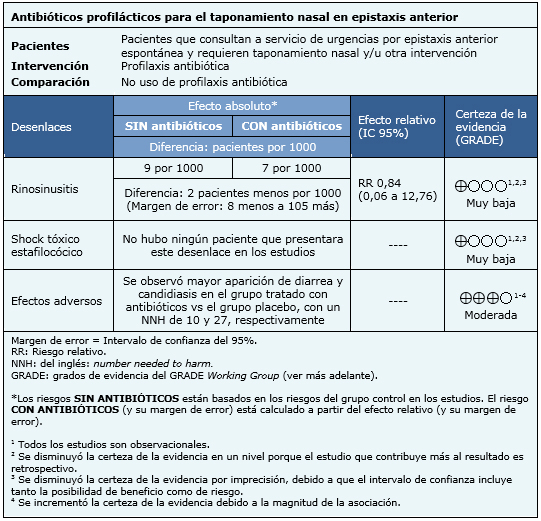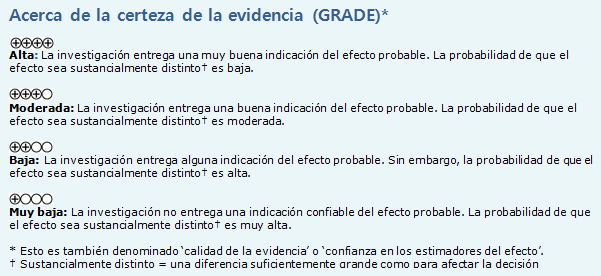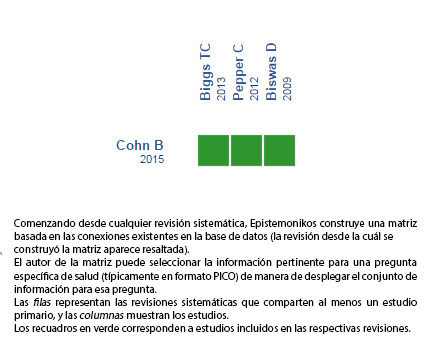Resúmenes Epistemonikos
← vista completaPublicado el 8 de enero de 2016 | http://doi.org/10.5867/medwave.2015.6357
¿Es necesaria la profilaxis antibiótica para el taponamiento nasal en epistaxis anterior?
Is antibiotic prophylaxis in nasal packing for anterior epistaxis needed?
Resumen
La epistaxis es un problema extremadamente común que en ocasiones requiere de taponamiento anterior. Usualmente se indican antibióticos de forma concomitante para la prevención de complicaciones infecciosas, aunque el rol de esta medida es controvertido. Utilizando la base de datos Epistemonikos, la cual es mantenida mediante búsquedas en 30 bases de datos, identificamos una revisión sistemática que incluye tres estudios primarios, ninguno de ellos controlado y aleatorizado. Realizamos un metanálisis y tablas de resumen de los resultados utilizando el método GRADE. Concluimos que no está claro si los antibióticos profilácticos disminuyen las complicaciones infecciosas en pacientes con taponamiento nasal por epistaxis anterior porque la certeza de la evidencia es muy baja.
Problema
La epistaxis es un problema muy común, que por lo general se resuelve de manera espontánea. Sin embargo, en algunos casos requiere atención hospitalaria e intervenciones de distinta complejidad para su resolución. Entre éstas, una de las más comunes es el taponamiento anterior, luego de lo cual se suele indicar antibioterapia con el fin de prevenir complicaciones infecciosas.
Métodos
Utilizamos la base de datos Epistemonikos, la cual es mantenida mediante búsquedas en 30 bases de datos, para identificar revisiones sistemáticas y sus estudios primarios incluidos. Con esta información generamos un resumen estructurado, siguiendo un formato preestablecido, que incluye mensajes clave, un resumen del conjunto de evidencia (presentado como matriz de evidencia en Epistemonikos), metanálisis del total de los estudios, tablas de resumen de resultados con el método GRADE, y tabla de otras consideraciones para la toma de decisión.
|
Mensajes clave
|
Acerca del conjunto de evidencia para esta pregunta
|
Cuál es la evidencia. |
Encontramos sólo una revisión sistemática [1] que incluye tres estudios no aleatorizados, dos de ellos retrospectivos y uno prospectivo [2],[3],[4]. |
|
Qué tipo de pacientes incluyeron los estudios |
Todos los estudios incluyeron a pacientes atendidos en servicio de urgencias por epistaxis anterior espontánea que requirió taponamiento nasal y/u otra intervención para su resolución. |
|
Qué tipo de intervenciones incluyeron los estudios |
Todos los estudios compararon el uso de profilaxis antibiótica contra el no uso de antibióticos. En todos los estudios el antibiótico amoxicilina-ácido clavulánico era uno de los utilizados, aunque también se utilizaron otros como claritromicina y piperacilina/tazobactam [2],[4]. |
|
Qué tipo de desenlaces midieron |
El desenlace medido en los estudios primarios fue “complicaciones infecciosas”, término que incluye: rinosinusitis bacteriana, otitis media aguda y shock tóxico estafilocócico, a través de cuestionarios y/o exámenes de laboratorio o radiológicos en caso de ser necesarios. |
Resumen de los resultados
La información sobre los efectos de la administración de antibióticos en pacientes con taponamiento nasal por epistaxis está basada en tres estudios no aleatorizados que incluyen 234 pacientes. Todos los estudios midieron el desenlace rinosinusitis bacteriana y shock tóxico estafilocócico. La información sobre los efectos adversos proviene de una revisión sistemática que incluye 45 estudios controlados aleatorizados [5].
- No está claro si la profilaxis antibiótica disminuye o no el riesgo de rinosinusitis en pacientes con taponamiento nasal por epistaxis anterior porque la certeza de la evidencia es muy baja.
- No está claro si la profilaxis antibiótica disminuye el riesgo de shock tóxico estafilocócico en pacientes con taponamiento nasal por epistaxis anterior porque la certeza de la evidencia es muy baja.


Otras consideraciones para la toma de decisión
|
A quién se aplica y a quién no se aplica esta evidencia |
|
| Sobre los desenlaces incluidos en este resumen |
|
| Balance riesgo/beneficio y certeza de la evidencia |
|
| Qué piensan los pacientes y sus tratantes |
|
| Consideraciones de recursos |
|
|
Diferencias entre este resumen y otras fuentes |
|
| ¿Puede que cambie esta información en el futuro? |
|
Cómo realizamos este resumen
Mediante métodos automatizados y colaborativos recopilamos toda la evidencia relevante para la pregunta de interés y la presentamos en una matriz de evidencia.

Siga el enlace para acceder a la versión interactiva: Profilaxis antibiótica para el taponamiento nasal en epistaxis anterior
Notas
Si con posterioridad a la publicación de este resumen se publican nuevas revisiones sistemáticas sobre este tema, en la parte superior de la matriz se mostrará un aviso de “nueva evidencia”. Si bien el proyecto contempla la actualización periódica de estos resúmenes, los usuarios están invitados a comentar en Medwave o contactar a los autores mediante correo electrónico si creen que hay evidencia que motive una actualización más rápida.
Luego de crear una cuenta en Epistemonikos, al guardar las matrices recibirá notificaciones automáticas cada vez que exista nueva evidencia que potencialmente responda a esta pregunta. El detalle de los métodos para elaborar este resumen están descritos aquí: http://dx.doi.org/10.5867/medwave.2014.06.5997.
La Fundación Epistemonikos es una organización que busca acercar la información a quienes toman decisiones en salud, mediante el uso de tecnologías. Su principal desarrollo es la base de datos Epistemonikos (www.epistemonikos.org).
Los resúmenes de evidencia siguen un riguroso proceso de revisión por pares interno.
Declaración de conflictos de intereses
Los autores declaran no tener conflictos de intereses con la materia de este artículo.

